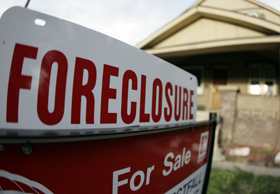| Home | Blog | Ask This | Showcase | Commentary | Comments | About Us | Contributors | Contact Us |

What the press can learn from its failure to report the housing bubble before it burstCOMMENTARY | October 19, 2009Reporters and editors need to evaluate arguments for themselves and get officials and economists to back up their statements, not just make assertions. That’s advice from someone who suspected early on that there was a bubble about to burst and did research that confirmed his suspicions. (Part of our series on "Reporting the Economic Collapse.") By John Hanrahanhanrahan@niemanwatchdog.org There are lessons for reporters and editors in their failure to identify the housing bubble before it burst and created chaos and collapse in the economy, says Washington, D.C. economist Dean Baker.
Baker, co-director of the Center for Economic and Policy Research (CEPR), said in an interview with Nieman Watchdog that he hopes the press will learn from its poor performance in its failure to warn of the housing bubble, which also caught most economists completely off-guard. Baker was one of the few economists to recognize the bubble and warn of it on a regular basis, having spotted it as early as 2002 when he wrote a paper on it entitled, “The Run-up in Home Prices: Is It Real or Is It Another Bubble?”
Baker’s concern about the housing market arose in 2002, he said, after he read statements by Alan Greenspan, then the chairman of the Federal Reserve, in which Greenspan said there was no bubble. Greenspan's explanation for the soaring housing prices "just made no sense to me" from an economist's standpoint, he said. As Baker recalled, Greenspan indicated the rising prices were due to such factors as higher incomes, population growth, tougher environmental restrictions on construction, limitations on buildable space restricting supply, increased immigration, etc. Baker said Greenspan’s reasoning seemed “completely disconnected from anything going on in the housing market.”
So Baker began looking at housing data going back to the 1950s and found that until the mid-1990s, the increase in housing prices kept close pace with the overall annual rate of inflation. Then, suddenly, housing prices began outpacing the general rate of inflation by 30 percent and then eventually by 70 percent. This huge "divergence from the historical data" was a tipoff that something was wrong. Looking further, Baker determined that nothing about the fundamentals of housing on the supply or demand side had changed, and one by one he examined all of Greenspan's premises and found them inadequate to explain the rapidly escalating housing prices.
In addition to the data, "after 2002 I began to see a lot of shaky loans, in cases where over half of first-time home buyers didn't put any money down. And whenever I would write about the housing bubble, I would get e-mails from around the country from people telling me about loan applications where numbers would be changed to reflect incomes higher than was actually the case.” All of this convinced Baker there was a housing bubble.
Yet all that came from Alan Greenspan about housing prices was good news. Given all these factors that Baker considered, "how could Greenspan and the Fed not know this was going on? It was right out there on the table."
With rare exceptions, the press, too, ignored the issue, taking their cue from Greenspan’s statements that rational, explainable market forces were at work driving up housing prices. Occasionally, Baker said, Yale University economist Robert J. Shiller would get quoted in the press about the housing bubble in years leading up to the housing market crash, but usually his comments were deep down in stories extolling the housing boom. Shiller, Baker said, had gone back even further -- all the way to the 1890s -- to examine data and found that for the next 100 years the price of housing had kept on the same pace as the overall rate of inflation, until it began to run wild in the 1990s.
Baker said the failure of most economists and the press to spot the housing bubble before it burst is a prime example of how reporters "need to evaluate the arguments for themselves" and not just uncritically accept the opinion of a few authority figures -- such as Greenspan -- as being the only word on the subject. Baker said reporters should probe more deeply for information to back up assertions by officials and economists, as well as talk to other economists who have strong arguments supported by data that run contrary to the common-wisdom position. That way, perhaps, the news media will warn of the next economic bubble before it bursts.
~~~~~~~~~~~~~~~~~~ Next in the ‘Reporting the Collapse’ series: Earlier in this series: Rein in entitlements? No. Increase them, says James Galbraith. It’s time the press stopped falling for false, ongoing efforts to portray Social Security and Medicare as going broke, says Galbraith in the first installment of his interview with John Hanrahan. As joblessness rises, reporters need to focus on calls for a second stimulus. Dean Baker sees a new, large stimulus as urgent. He has an alternate plan, also: Give companies tax credits to reduce workers’ hours (but not their pay) and put on new staff to take up the slack. Galbraith: Deficits are the solution, not the problem. The University of Texas economist views aiding households, not banks, ia the key to recovery. He is highly critical of most coverage of deficits and fiscal policy and singles out the Washington Post editorial page as the worse offender. Health care patents cost Americans hundreds of billions a year. Dean Baker says drug and medical device patents drive up costs enormously but are seldom if ever mentioned in the debate over health care reform. Drugs and equipment that could be sold profitably for a few dollars may instead sell for thousands.
Story ideas, from an expert. Dean Baker becomes assignment editor for a day, and asks for stories on deficits, on the mathematical basis for figuring the right size of a stimulus program, and the set-up by which banks borrow money from the Federal Reserve at 0 percent and re-lend it to the Treasury at 3-1/2 percent. Where’s the reporting on the fraud that led to the crash?The mortgage-related crash was the product of wide-scale criminal fraud, says economist James Galbraith, and people should be going to prison. Instead, he says, the press has pretty much ignored that aspect of it, treating the issue as boys-will-be boys.
|
|
||||||||||||




